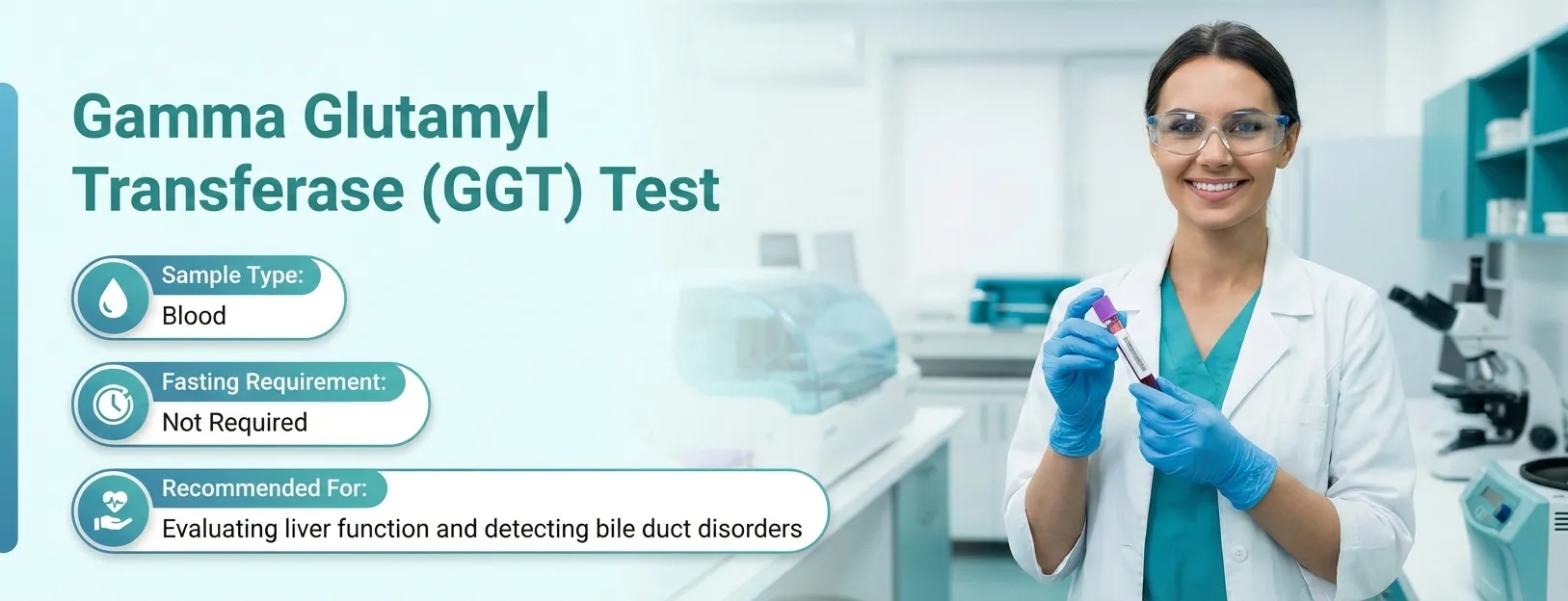34+ orders placed in your location
100% NABL & ISO Certified Lab • 100% Accurate Reports
Gamma Glutamyl Transferase (GGT) Test
Gamma-glutamyl transpeptidase, GTP, Gamma-GT, GGTP
- SummaryThe GGT (Gamma-Glutamyl Transferase) test measures the level of the GGT enzyme in the blood, primarily used to evaluate liver function and detect bile duct problems or alcohol-related liver diseases. It is done through a blood sample, and fasting for at least 8 hours is recommended for accurate results.Read more
- Reports Within11 HrsView Sample Report100% NABL & ISO Certified Labs
- SampleBlood
- AgeAll Age Group
- GenderMale and Female
- FastingNot Required
PharmEasy Promises
Know More About The Test
A quick info on Gamma Glutamyl Transferase (GGT) Test
Overview
Gamma-glutamyl transferase (GGT) is an enzyme found in many organs throughout the body, with the liver having the highest concentration. GGT levels in the blood get elevated in most disorders that affect the liver or bile ducts. This test determines the amount of GGT present in a blood sample.
GGT is present in small amounts in the blood, but when the liver is damaged, the level of GGT increases. When the bile ducts become clogged due to tumours or stones, GGT is the first liver enzyme to rise in the blood. GGT is a sensitive enzyme test used for the diagnosis of bile duct issues.
It increases with many types of liver disorders, such as liver cancer and viral hepatitis. Gamma GT test chart spikes up in non-hepatic ailments, such as Acute Coronary Syndrome. Due to these reasons, the GGT test does not help in differentiating between various causes of liver damage. As a result, the GGT test is not a routine test.
The gamma GT test is used for the diagnosis of causes obstructing the bile duct and for monitoring liver functioning. It is used in conjunction with other tests to determine the source of a high level of alkaline phosphatase (ALP), another liver enzyme.
In liver diseases, GGT and ALP show an increase. The ALP is also increased in bone disorders. As a result, GGT is helpful as a follow-up test to establish whether an elevated ALP result is related to liver or bone illness.
The gamma GT test results help determine why the alkaline phosphatase (ALP) is high. In bile duct illness and several liver diseases, ALP and GGT show elevation, while only ALP is elevated in bone diseases. As a result, if a person’s gamma GT values are in the normal range but their ALP is high, the cause is most likely a bone disease.
The gamma GT test reports help in detecting liver disease and bile duct obstructions. GGT tests are ordered along with other liver tests such as alanine aminotransferase (ALT), aspartate aminotransferase (AST), ALP and Gamma-glutamyl transpeptidase.
An increased gamma GT value indicates liver damage but does not reveal the condition that is causing it.
Risk Assessment
Chronic alcoholism, Cirrhosis, Fatty liver, Hepatitis, Biliary disorders, Liver cancer, Heart failure, Hypertension
What does this test detect?
The gamma GT test procedure measures levels of gamma-glutamyl transferase levels in the blood sample.
Gamma GT test is prescribed for alcoholics in the following conditions:
- The GGT test can be used in cases of chronic alcohol abuse. The gamma GT values increase in around 75% of chronic alcoholics.
- The GGT test is also essential to monitor alcohol use or alcohol abuse.
- In patients undergoing alcohol de-addiction or alcoholic hepatitis therapy.
- When the ALP level is high, a GGT test may be helpful.
- When ALP test results are high, but the other tests in the liver panel (such as AST and ALT) are not.
- When an individual with a history of alcohol abuse has finished alcohol treatment, to ensure the prognosis of the treatment.
- To determine whether someone is suffering from acute or chronic alcoholism.
- In conjunction with or as a follow-up to other liver function tests.
- To diagnose liver illness and bile duct blockages.
This test is done for all genders and adults.
Indications for GGT Test
The GGT test is indicated in symptoms that imply liver disease, such as:
- Weakness
- Fatigue
- Loss of appetite
- Nausea and vomiting
- Abdominal swelling and pain
- Jaundice
- Dark urine
- Light-coloured stool
- Itching (pruritus)
- Decreased appetite
- Lack of energy
- Abdominal pain
How frequently should you take this test?
The gamma GT test is repeated based on the symptoms and as per the advice of the doctor. The doctor will advise repetition to:
- Monitor an existing hepatobiliary disorder
- Assess the treatment for a hepatobiliary disorder
- Monitor liver health in chronic drinkers
Based on the health condition, the doctor will repeat the gamma-GT test procedure as follows:
- Liver/pancreas/bile duct/gallbladder disease: Repeat every 3-6 months for prognosis.
- Liver disease due to chemotherapy: Repeat every 3-6 months for prognosis.
- Hepatobiliary disease due to alcoholism: Repeat every 3-4 months for prognosis.
Test Preparation
What to Expect During the Test
Before the Test
Before undergoing the GGT test, it is important to fast for A to B hours beforehand. This fasting period is crucial for achieving accurate test results. Therefore, it is wise to seek advice from a doctor before taking any test to determine if there are any specific restrictions in place.
During the Test
A phlebotomist will draw blood from a vein in your arm for the sample. Your experience will likely involve:
- Disinfecting the site where the needle will be inserted with an antiseptic.
- Wrapping a tourniquet around your arm to make the veins more visible.
- Inserting a disposable needle into the vein to collect the blood. This process may cause minor discomfort from the needle and could take a few seconds.
- Placing the sample in a small container or test tube labelled with your test information.
After the Test
After the Blood is Collected:
- Applying a bandage to the site where the needle was inserted to prevent any bleeding.
- You may feel slightly sore or lightheaded, which is normal and nothing to be concerned about. You may be advised to rest for a few minutes.
- Contact your doctor if you experience any bleeding, discomfort, or rashes at the puncture site.
Parameters
The gamma GT report evaluates the levels of gamma-glutamyl transferase levels in the blood sample.
The gamma GT test values will be either:
- Increased
- Normal range
- Decreased
The level of the GGT enzyme is the only parameter included in this test.
Ranges
The international units per litre or IU/L is used to represent the gamma GT results.
Adults have a normal range of 15 to 73 U/L.
The gamma GT normal ranges may differ slightly between laboratories. Any abnormal values in the gamma GT test do not indicate serious problems.
A transient rise in the gamma GT values can be caused by a small quantity of alcohol consumption 24 hours before the GGT test. Individual genetic variability can produce variations in GGT's reaction to alcohol consumption and smoking.
The normal values and reference ranges of the test may vary from lab to lab. Please refer to the ranges mentioned in the report and consult a doctor to understand the interpretation of lab reports.
Test Result Interpretation
GGT is quite a sensitive test and the level might rise even without any symptoms. This rise could be transitory as a result of some ongoing medications. It is advisable to take into consideration the variable factors before interpretation.
Elevated levels of gamma GT mean a possible diagnosis of any of the following conditions:
- Alcohol consumption: Even with negligible amounts of alcohol, the GGT levels can sometimes rise.
- Chronic alcoholism: Heavy drinkers have higher gamma GT chart values than persons who drink less than 2 to 3 drinks per day.
- Liver damage: An elevated gamma GT value suggests that the liver is suffering damage, but it does not explicitly point to a disorder causing the damage.
- Hepatitis: Hepatitis could be due to a viral infection or chronic inflammation. Hepatitis affects liver parenchyma, thereby increasing values in the gamma GT chart.
- Cirrhosis: A healthy liver tissue after chronic inflammation undergoes some changes. This permanent damage replaces liver cells with scarring, known as cirrhosis. The gamma GT report values are elevated in alcoholic cirrhosis.
- Obstructive liver disease: When one of the ducts that transport bile from the liver to the intestine becomes clogged, it is known as a bile duct blockage. This blockage, if left untreated, can lead to infection.
- Congestive heart failure: The gamma GT values increase in coronary heart disease (CHD), stroke, arterial hypertension, heart failure and cardiac arrhythmias.
- Metabolic syndrome: Studies suggest that increased GGT is part of the clusters of metabolic syndrome.
- Diabetes: Over the last 40 years, numerous epidemiological studies have revealed a high prevalence of increased GGT levels among diabetic individuals.
- Pancreatitis: An inflammation of the pancreas causes moderate elevations in GGT activity.
Some of the conditions where gamma GT reports show elevation include:
- Liver cancer
- Bone disease
- Overuse of certain drugs or other toxins
- Hyperthyroidism
- Rheumatoid arthritis
- Obstructive pulmonary disease
A GGT test result of a low or normal range suggests that the person does not have liver disease or has not ingested any alcohol.
An abnormal gamma GT chart doesn't always mean a serious medical condition. Some factors such as medications and drugs cause gamma GT range elevation.
For appropriate interpretation of gamma GT results, consult the concerned physician.
If the other liver enzymes are normal, the doctor may repeat the gamma GT test results.
Price/Cost
Depending on the city and the lab, the cost of a GGT test can differ. Generally, the price for a GGT test ranges from INR 169 to INR 329. Here's a detailed breakdown of the average expenses for a GGT test in several key cities in India:
City | Min Price | Average Price | Max Price |
GGT Test Price in Bengaluru | 169 | 249 | 329 |
GGT Test Price in Chennai | 169 | 249 | 329 |
GGT Test Price in Delhi | 169 | 249 | 329 |
GGT Test Price in Hyderabad | 169 | 249 | 329 |
GGT Test Price in Kolkata | 169 | 249 | 329 |
GGT Test Price in Lucknow | 169 | 249 | 329 |
GGT Test Price in Mumbai | 169 | 249 | 329 |
GGT Test Price in Nagpur | 169 | 249 | 329 |
GGT Test Price in Patna | 169 | 249 | 329 |
GGT Test Price in Pune | 169 | 249 | 329 |
Risks and Limitations
The GGT blood test is a common blood test with a very low risk of complications. Seek medical advice right away if you notice-
- Excessive bleeding following the needle insertion.
- Discomfort or swelling at the insertion site.
Limitations of the test
- Negative impact on the outcome of the test due to equipment or human errors.
- Wrong understanding of the markers.
Was This Test Information Helpful?
Please rate your experience
References
Health packages containing 'Gamma Glutamyl Transferase (GGT) Test'
People Also Ask
What does high gamma GT mean in a blood test?
What level of GGT is too high?
What is a normal gamma GT level?
What happens if GGT is high?
What is the price of a GGT test?
Have any doubts? Ask us.
Ask us anything about the Gamma Glutamyl Transferase (GGT) Test to understand it better
We provide trusted, expert-curated health content to support better awareness,prevention, and care.
Backed by experienced doctors, medical experts, and strict editorial standards.


